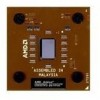AMD AXDA3200DKV4E Data Sheet - Page 86
FID[3:0] Pins, FID[3] Y3, and FID[0] W1 are
 |
View all AMD AXDA3200DKV4E manuals
Add to My Manuals
Save this manual to your list of manuals |
Page 86 highlights
Preliminary Information AMD Athlon™ XP Processor Model 10 Data Sheet 26237C-May 2003 FID[3:0] Pins 74 FID[3] (Y3), FID[2] (Y1), FID[1] (W3), and FID[0] (W1) are the 4-bit processor clock-to-SYSCLK ratio. Table 25 describes the encodings of the clock multipliers on FID[3:0]. Table 25. FID[3:0] Clock Multiplier Encodings FID[3:0]2 Processor Clock to SYSCLK Frequency Ratio 0000 11 0001 11.5 0010 12 0011 ≥ 12.51 0100 5 0101 5.5 0110 6 0111 6.5 1000 7 1001 7.5 1010 8 1011 8.5 1100 9 1101 9.5 1110 10 1111 10.5 Notes: 1. All ratios greater than or equal to 12.5x have the same FID[3:0] code of 0011b, which causes the SIP configuration for all ratios of 12.5x or greater to be the same. 2. BIOS initializes the CLK_Ctl MSR during the POST routine. This CLK_Ctl setting is used with all FID combinations and selects a Halt disconnect divisor and a Stop Grant disconnect divisor. For more information, refer to the AMD Athlon™ and AMD Duron™ Processors BIOS, Software, and Debug Developers Guide, order# 21656. The FID[3:0] signals are open-drain processor outputs that are pulled High on the motherboard and sampled by the chipset to determine the SIP (serial initialization packet) that is sent to the processor. The FID[3:0] signals are valid after PWROK is asserted. The FID[3:0]signals must not be sampled until they become valid. See the AMD Athlon™ and AMD Duron™ System Bus Specification, order# 21902 for more information about Serialization Initialization Packets and SIP protocol. The processor FID[3:0] outputs are open-drain and 2.5-V tolerant. To prevent damage to the processor, do not pull these Pin Descriptions Chapter 11















